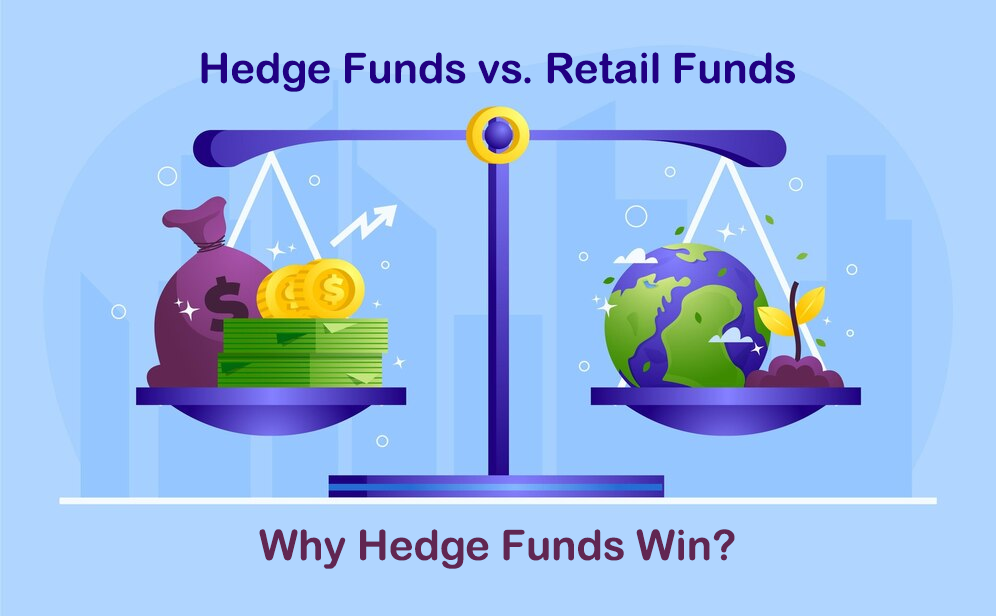Hedge Funds vs. Retail Funds: Why Hedge Funds Win?
Want to know why sophisticated investors are moving away from mutual funds toward Hedge Funds?
This article breaks down exactly how Hedge Funds outperform Retail Funds in terms of returns, flexibility, risk protection, and tax efficiency—backed by real-world performance.
Here’s what you’ll learn:- ✅ How hedge funds consistently generate alpha, even in market crashes
- ✅ Why their strategies are more flexible and powerful than traditional retail models
- ✅ What benefits you gain as an investor—from tax perks to smarter manager incentives

Table of Contents
Introduction:
In today’s volatile financial markets, choosing the right investment vehicle can make or break your long-term wealth. Hedge Funds vs Retail Funds is no longer just a debate—it’s a necessary comparison. Hedge funds are now favored by HNIs and institutional investors seeking higher returns, better risk management, and diversified investment opportunities.
Understanding Hedge Funds vs Retail Funds
Retail funds, such as mutual funds, are built for mass-market accessibility. They typically invest in equities and follow a long-only approach.
Hedge fund, on the other hand, are tailored for qualified investors. They deploy advanced strategies—like short selling, leverage, and derivatives—to produce returns in both rising and falling markets.
| No | Feature | Retail Funds | Hedge Funds |
|---|---|---|---|
| 1 | Investor Access | Anyone | Qualified investors only |
| 2 | Strategy | Long-only | Long-short, arbitrage, derivatives |
| 3 | Risk Management | Passive | Active hedging and dynamic rebalancing |
| 4 | Returns Objective | Relative to benchmark | Absolute returns |
| 5 | Fees | Flat % of AUM | Performance-based (2 & 20 model) |
Key Benefits of Hedge Funds
🔼 Higher Returns Potential
- Use of leverage, short-selling, and derivatives amplifies upside.
- Focus on absolute returns — gains regardless of market direction.
- In down markets, hedge funds aim to profit where retail funds often lose value.
🔁 Diversified and Flexible Strategies
- Invest across asset classes: equities, commodities, currencies, and more.
- Strategies include long-short equity, event-driven, macro, and arbitrage.
- Regulatory freedom allows faster adaptation to market changes.
🛡️ Lower Market Impact and Risk Hedging
- Hedge funds use dynamic hedging, derivatives, and real-time risk models.
- Often include investor lock-in periods to prevent panic withdrawals.
- Reduce volatility exposure more effectively than retail mutual funds.
💼 Performance-Linked Incentives
- “2 and 20” fee model aligns fund manager incentives with investor profits.
- Unlike mutual funds, no reward unless actual performance is delivered.
- Attracts top fund managers who bet on their own performance.
💸 Tax Efficiency
- Hedge funds can optimize tax exposure using intelligent trade timing and instruments.
- Structures like Alternative Investment Funds (AIFs) in India are built for tax optimization.
- Mutual fund investors often face additional taxes like DDT and capital gains.
Key Considerations Before Investing in Hedge Funds
While hedge funds clearly outclass retail funds in many aspects, here are a few things to note:
- 🚨 Higher Fees – Performance fees can reduce net gains if not carefully monitored.
- 🚨 Liquidity Constraints – Lock-in periods can limit fund withdrawals.
- 🚨 Investor Eligibility – In India, SEBI’s AIF norms apply, including minimum investment criteria.
If you’re a qualified investor who understands these dynamics, hedge fund could be a game-changer.
Conclusion
- Superior returns across market cycles
- Advanced strategies that reduce risk
- Tax benefits and better manager alignment
✅ Next Step
- 🎯 Ready to explore hedge fund options that align with your financial goals?
- 👉 [Sign up for the upcoming EXCLUSIVE Webinar: Webinar]


